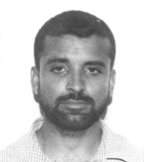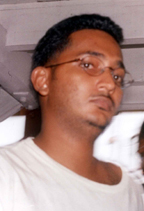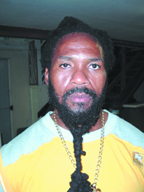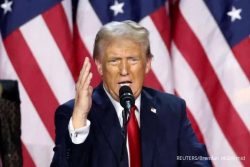Drug accused Roger Khan and another Guyanese man, who is wanted by the US and is now on the run, threatened family members of Devendra Persaud and Khan’s phantom group put a hit on Persaud when they discovered that he had a ledger on the drug business with their names in it, US prosecutors say.
According to the court documents filed by the US government it will provide evidence that Khan, his bodyguards and the man, who was also Persaud’s cocaine trafficking partner, had gone to Persaud’s wife boutique and pointed a gun at her while she held her young child in her arms. At the time Persaud had been charged with bulk cash smuggling and conspiring to import cocaine into the United States, and they had demanded to know his case number.
 Last month, the US government had accused Khan of murdering Persaud and boxing coach Donald Allison and the court had requested that the government outline in more detail its proof of the uncharged activities as it relates to the Persaud and Allison murders. The government was given until June 24, to submit a supplement to its in limine motion to obtain a pre-trial ruling to admit certain evidence of uncharged activity. That supplement has since been filed and awaits the court’s ruling.
Last month, the US government had accused Khan of murdering Persaud and boxing coach Donald Allison and the court had requested that the government outline in more detail its proof of the uncharged activities as it relates to the Persaud and Allison murders. The government was given until June 24, to submit a supplement to its in limine motion to obtain a pre-trial ruling to admit certain evidence of uncharged activity. That supplement has since been filed and awaits the court’s ruling.
Khan, through his lawyers, has since denied that he was involved in the murders. Among other things, Khan’s lawyers had said that national cyclist Tyrone Hamilton, who was with Persaud at the time of his death, knew who killed Persaud and had told them so.
 Hamilton has since told Stabroek News that he did not know who killed Persaud and that he had told Khan’s lawyers no such thing.
Hamilton has since told Stabroek News that he did not know who killed Persaud and that he had told Khan’s lawyers no such thing.
The prosecution has told the court that it would offer recorded evidence from Persaud’s wife that Khan did threaten her and first-hand testimonies from co-conspirators in the Persaud and Allison murders.
According to information provided in a court document seen by this newspaper, Persaud relocated to the United States and settled in Queens, New York. Persaud received cocaine from the Khan organization, distributed it to others, and then sent money back to the organization in Guyana.
The government said it would establish at trial that one nickname for the defendant was ‘Shortman’. “Multiple cooperating witnesses will testify that Khan was called ‘Shortman’. Further, the cooperating witnesses who know Persaud will testify that Persaud called the defendant ‘Shortman’ and ‘Roger’,” the court document said.
According to the document, Persaud’s cocaine trafficking partner [name mentioned], who is now on the run, also went by the nicknames ‘Ledge’ and ‘Kevin’. That person was sometimes in the New York City area, and sometimes in Guyana during the cocaine conspiracy with Persaud.
Persaud was arrested in June 2003 at John F. Kennedy airport, and was charged with bulk cash smuggling and conspiring to import cocaine into the United States. “Thereafter, Persaud was released on bond. He ultimately cooperated with US law enforcement, including participating in numerous proffers and agreeing to have his cellular telephone calls recorded, among other things,” the document said adding that after his arrest Persaud’s partner returned to Guyana and remained here.
On December 22, 2003, Persaud’s wife, who resided here and operated a boutique, called him in Queens. “In a call to Persaud’s telephone that was being consensually recorded by the government, Persaud’s wife informed him that ‘Shorty’, his bodyguards, and ‘Ledge’ had come into her store and threatened and pointed a gun at her while she held their child. She informed Persaud that they demanded to know his case number.”
It was two days after this call that Persaud jumped bail and returned to Guyana and after he fled, agents with US Immigration and Customs Enforcement (ICE) searched his former residence and discovered, among other things, drug ledgers used by him. “In the ledger, ‘Shortman’ is reference(d) with a telephone number. Many other co-conspirators are listed in the ledgers. Individuals in the cocaine industry in Guyana, including Khan, suspected that Persaud was cooperating with US law enforcement,” the document said.
Further, the document said, Khan and his closest associate were angry because they had learned that their names were contained in Persaud’s ledger. Additionally, Persaud owed Khan a drug debt. Khan’s organisation seized a BMW that Persaud had owned in the United States, and had shipped to Guyana, as payment toward the debt. “Khan’s co-conspirators arrived at Persaud’s store in Guyana, and took his car from him. Eventually, Khan and his ‘Phantom Squad’ put a ‘hit’ on Persaud. In October 2004, Khan was informed by a member of his organisation that Persaud was at the Palm Court restaurant in Guyana. In response, Khan stated, in sum and substance, that Persaud should be killed that night. Shortly thereafter, Persaud was shot to death at the Palm Court restaurant. “
In relation to Allison, the government said its proof that Khan ordered the murder of the man will include the testimony from a witness that Allison and others imported cocaine into the United States that was obtained from the Khan organisation.
Also that the cocaine was seized and that one of Khan’s co-conspirators demanded proof that the cocaine was seized, to prove that Allison and others had not stolen it. The prosecution also promised to produce testimony that “Allison refused to work in Khan’s organization, and once publicly insulted Khan.” Further, testimony that Khan’s organisation shot Allison and testimony that Khan took credit for killing Allison.





